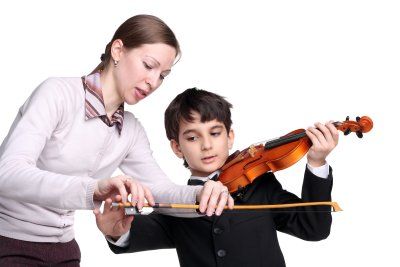













































Empowering teachers with the skills to use music in the classroom can boost not only music skills in children, but also helps to improve aspects of literacy, particularly reading.
The scheme, now in its second full year, is being run by the New London Orchestra, which provided in-service training (Inset) for teachers. Sessions involving the teaching of music and literacy activities took place in 30 primary schools in the London Borough of Newham, involving around 650 teachers during 2011- 2012.
The previous (first) year's scheme evaluation (available at http://www.imerc.org)
had found that the children taking part in the scheme had significantly
improved their reading abilities compared to those in control groups.
This positive finding led to the NLO organising the professional
development programme that built on the evaluation of the first year.
Literacy through Music is made possible through a donation to the New London Orchestra from the JPMorgan Chase Foundation.
Researchers from the Institute of Education carried
out a thorough evaluation of the latest phase of the programme by
surveying the teachers who took part.
Professor Graham Welch, who led the research, said:
"The New London Orchestra's Literacy through Music
project is demonstrating the power of music to enhance the quality of
children's learning in other areas of development. A key design feature
is the close partnership and teamwork exhibited by NLO musicians,
teachers and teaching assistants. The outcomes of the initiative are
very positive".
The researchers found that the training had led to a
significant shift in the teachers' understanding of how music activities
could be used to support literacy. By the end of the programme,
two-thirds of teachers had used music-based activities to support other
aspects of learning, including literacy, and said they would now them
use them on a daily basis.
The programme is also having a positive impact on the
participants' confidence and enjoyment in teaching music – the numbers
who did so doubled, as did the number who considered themselves to be
musicians as a result of the training.
Teachers were very positive. One participant said:
"The Insets (In-Service Training sessions) were
brilliant, and as a non-musician, were incredibly useful. I will
definitely use all of the games and activities that we used to enhance
my teaching."
These results suggest that programmes such as this
could be used around the country to motivate and excite teachers and
their pupils, the researchers conclude.
Christine Whatford CBE, a trustee of the New London Orchestra and a former Director of Education of the London Borough of Hammersmith and Fulham, said: "Results from the NLO's Literacy through Music programme continue to be pleasing. It is rewarding to know that Literacy through Music is having a real and measurable impact."